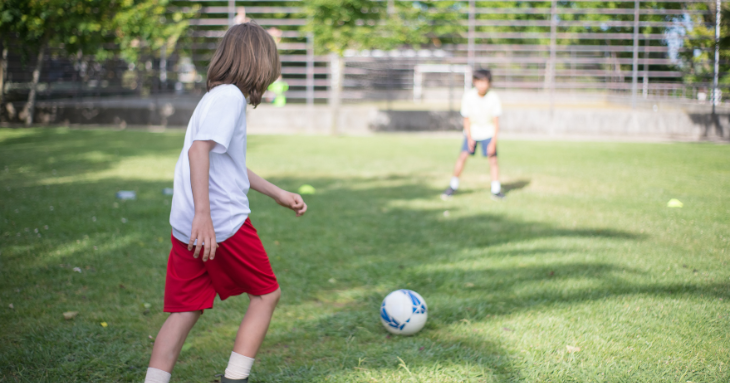
How to Train Your Kid in Soccer If You've Never Played the Sport
Soccer, often referred to as the beautiful game, is the most popular sport enjoyed by millions of kids worldwide. As a parent, you may find yourself in a situation where your child has a strong interest in soccer, even though you’ve never played the sport yourself.
While it might seem daunting at first, coaching your child in soccer is not only possible but can also be a rewarding experience for both you and your young athlete.
In this post, we’ll explore how to effectively train your child in soccer, even if you have little or no prior experience with the game.
Table of Contents
- Understanding the Basics of Soccer
- Fostering a Love for the Game
- Finding Reliable Resources
- Creating a Structured Training Plan
- Fundamental Soccer Skills to Focus On
- The Importance of Fun and Encouragement
- Incorporating Game-Like Scenarios
- Balancing Practices and Rest
- Building a Support System
- Evaluating Progress and Adjusting
Understanding the Basics of Soccer
Before you begin coaching your child in soccer, it’s essential to have a basic understanding of the sport. Familiarize yourself with the rules, positions, and fundamental skills such as dribbling, passing, and shooting.
Watch Youtube videos of players doing the most basic skills so that you can understand the elements of the game.
You don’t need to be an expert, but having a grasp of the game’s fundamentals will help you communicate better with your child and provide valuable guidance.
Fostering a Love for the Game
One of the most critical aspects of training your child in soccer is to nurture their love for the sport. Make soccer enjoyable by watching games together, attending local matches, or playing soccer-related games.
Encourage your child to develop a genuine passion for the game, which will drive their motivation to improve. Learn about the history of the game with them. Get them books about the sport, or listen to audio books about their favorite players.
If you’re in the U.S., most college teams have sports teams. Those tickets tend to be cheap compared to professional sports, so consider getting tickets for the local college team and watch them regularly with your child.
Related Post Coaching Tips for Youth Soccer Parents
Finding Reliable Resources
While you may not have extensive soccer experience, there are numerous resources available to help you become an effective soccer coach for your child. These resources include:
Books: Look for beginner’s guides and coaching manuals tailored to youth soccer.
Online Videos: Platforms like YouTube offer a wealth of soccer coaching tutorials and drills. Soccer federations sometimes also offer virtual trainings, like U.S. Soccer’s coaching courses.
Local Clubs and Coaches: Consider enrolling your child in a reputable soccer club or seeking guidance from experienced coaches. Talk to coaches and find out what their focus is. You don’t want to put a child with a passion for the game in the hands of a coach who won’t focus on their development.
Creating a Structured Training Plan
Establishing a structured training plan is crucial for your child’s soccer development. Outline a weekly training schedule that includes specific drills and exercises. The main goal here is for them to touch the ball as much as possible.
Focus on breaking down each practice into manageable segments to maintain your child’s attention and enthusiasm. Make it exciting.
Drills can be boring for kids, but if you make a game of it with something at stake, you’re more likely to get your child’s enthusiastic participation.
Fundamental Soccer Skills to Focus On
While there are many aspects of soccer to cover, concentrate on teaching your child the following fundamental skills:
Dribbling: Teach your child how to control the ball while running, using both feet.
Passing: Focus on accurate and controlled passing techniques. Teach them the basics of passing and moving around the field so that they can positively contribute to the game.
Shooting: Help your child improve their shooting accuracy and power. Proper shooting technique learned at a young age will help them become better players as they grow in the game.
Ball Control: Emphasize receiving the ball with various parts of the body, such as the feet, chest, and head.
Defensive Skills: Teach basic defensive skills like positioning, tackling, and marking.
Remember to break down these skills into manageable steps, gradually progressing from simple to more complex exercises.
The Importance of Fun and Encouragement
Make soccer practices enjoyable for your child. Keep the atmosphere positive and encourage their efforts. Praise their achievements, no matter how small, and provide constructive feedback.
Creating a supportive and nurturing environment will foster their love for the sport and build their self-confidence.
Whatever you do, do not harp on their mistakes. Stop when you see that they’re getting frustrated. You don’t want them to end up hating the sport.
Related Post The Importance of Teamwork in Youth Soccer
Incorporating Game-Like Scenarios
Soccer is a dynamic sport, and it’s essential to simulate game-like scenarios during training. Practice small-sided games, drills that involve decision-making, and scenarios that replicate real game situations.
If practice is just the two of you, create 1 v 1 game scenarios so that they can practice both attacking and defending. Don’t be afraid to score on them.
You want them to learn how to react when things aren’t going well for them, This helps your child apply their skills in a practical context and improves their soccer IQ.
Balancing Practices and Rest
While training is crucial, it’s equally important to ensure your child gets enough rest and recovery. Overtraining can lead to burnout and injuries.
Your child is not a professional. Maintain a balance between soccer practices, other activities, and relaxation to keep your child physically and mentally healthy.
You want them to develop a lifelong practice of fitness and proper care. Soccer is just one way of doing that, so make sure you’re balancing it with other things they love to do.
Building a Support System
Consider involving other parents or family members in your child’s soccer journey. You can create a support system by connecting with other soccer parents, sharing resources, and attending games together.
If they have a friend who is also enthusiastic about the sport, incorporate them into your training sessions. A supportive community can provide valuable insights and motivation for both you and your child.
Evaluating Progress and Adjusting
Regularly assess your child’s progress and make necessary adjustments to the training plan. Pay attention to their strengths and weaknesses and tailor the training accordingly.
Celebrate their achievements and set realistic goals for continuous improvement. Talk to them about where they think they can improve. Sometimes the best way to improve a child’s abilities is to find out what they think about how they’re doing.

Coaching your child in soccer, even if you have little or no prior experience with the sport, is entirely achievable with dedication, patience, and the right approach.
By understanding the basics of soccer, fostering a love for the game, utilizing reliable resources, creating a structured training plan, focusing on fundamental skills, emphasizing fun and encouragement, incorporating game-like scenarios, balancing practices and rest, building a support system, and evaluating progress, you can provide your child with a positive and rewarding soccer experience.
Remember that your role as a parent-coach is not just about soccer development but also about nurturing their passion, self-confidence, and love for the beautiful game. Enjoy the journey of watching your child grow and thrive in soccer!